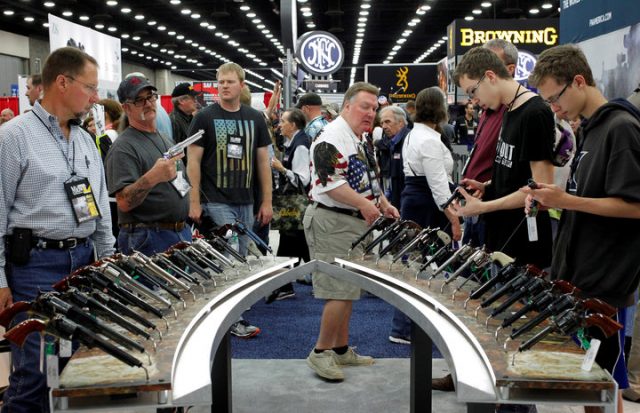
Gunshot-related deaths and injuries temporarily show a dramatic decline when the National Rifle Association is holding its annual convention, according to a new analysis in the New England Journal of Medicine.
The authors say it’s evidence that firearms — even in the hands of experienced users — are inherently dangerous and accidents don’t just happen among novices.
Dr. Anupam Jena of Harvard Medical School and Andrew Olenski of Columbia University compared firearm injuries during the conventions each year from 2007 through 2015 with injury rates three weeks before and three weeks after each event.
A decline of 63 percent was seen in the states where the conventions were being held, apparently due to large numbers of gun owners being at the events, as well as, in some cases, gun venues such as firing ranges or hunting grounds having closed while their staff attended the convention.
Nationally, there was a 20 percent reduction in firearm injuries during the convention.
In contrast, gun-related crime did not decrease during the conventions.
The drop in injuries was only seen among men. It was most prominent in the states with the highest rate of gun ownership, and among people living in the South and the West.
“These findings are consistent with reductions in firearm injuries occurring as a result of lower rates of firearm use during the brief period when many firearm owners and owners of places where firearms are used may be attending an NRA convention,” they said. “Our results suggest that firearm-safety concerns and risks of injury are relevant even among experienced gun owners.”
The NRA did not immediately respond to a request for comment.
The study comes at a time when Americans own an estimated 265 million to 300 million guns, which is about one for every adult. Thirty percent of Americans say they own at least one gun, and another 11 percent say they live in a household with someone who owns one, according to the Pew Research Center. In 2014, 461 people died from an accidental firearm discharge and 15,928 were injured, nearly 2,000 of whom were children, the study authors note.
“This passes the sniff test. It makes sense that decreased exposure and decreased usage would result in fewer events,” said Dr. Stephen Hargarten, chairman of emergency medicine at the Medical College of Wisconsin, in Milwaukee, who was not involved in the study.
“I have worked with lifetime members of the NRA who secretly confess that they have unintended discharges of their rifles or shotguns. And this study doesn’t account for the unintended discharges that didn’t result in injury,” he told Reuters Health in a telephone interview.
“We’re saying, ‘Here’s a brief period of time when people likely to use guns are not using them,’” and the injury rates go down, Jena told Reuters Health by phone.
The researchers used an insurance database to track firearm injuries during conventions in Nashville, Indianapolis, Houston, St. Louis, Pittsburgh, Charlotte, Phoenix, Louisville and St. Louis.
Nationally, the rate of firearm injury dropped from 1.5 per 100,000 on the dates adjacent to the convention to 1.2 per 100,000 during the convention itself. And in the state where the convention was held, the injury rate went from 1.9 down to 0.7 per 100,000.
With as many as 80,000 firearm owners attending a convention, “the relationship is not just possibly due to 80,000 members not using firearms as much during the date of the convention,” Jena said. “It could be that firing ranges and hunting grounds are more likely to be closed. There could be a larger network effect that could be at play here.”
It’s also relevant that the effect is largest in states that hold a meeting in a given year, he noted. “If the convention is closer to you in a given year, the effect should be larger, and we find that.”
During the NRA’s Atlanta convention in 2017, 60 percent of the 81,000 NRA members traveled more than 200 miles to attend, according to the organization’s 2018 convention website.
“I think the most sophisticated and reasoned gun supporters will not be surprised by this,” Jena said. “All we are saying is that guns are inherently unsafe and you recognize that whenever you use a firearm. Even an experienced user may still suffer from a gun-related injury. That’s like saying even the best drivers in the world may still get in a car accident. Why? Because driving is inherently an unsafe activity compared to walking around in circles in your house.”
It would seem reasonable to investigate ways to make guns safer, Hargarten said. “We’ve integrated safety features into other products, but there has not been a collective discussion about this product, as we had with cars in the 1960s.”









